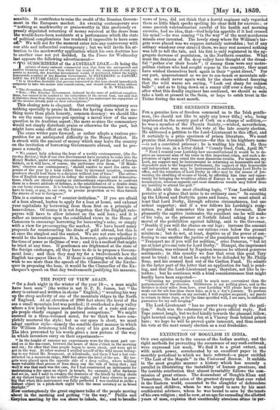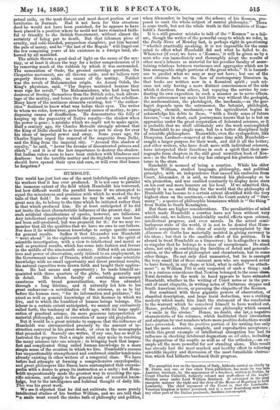EXTINCTION OF MOGULLSII IN INDIA.
Otnt own opinion as to the causes of the Indian mutiny, and the right methods for preventing the recurrence of any such outbreak, were expressed last week. We find it to a great extent, and with much power, corroborated by' an excellent paper in the monthly periodical to which we have referred—a paper entitled "The Last of the Moguls" in the Universal Review. It unfolds in the most graphic manner a history which has scarcely a parallel in illustrating the instability of human greatness, and the terrible retribution that almost invariably follows the com- mission of great crimes. The descendant of Genghis Khan and Tamerlane, the last scion of the greatest dynasty that ever ruled in the Eastern world, consented to the slaughter of defenceless women and children, whom he was urged to save by his most confidential advisers, whom he was bound to save by the tenets of his own religion ; and he now, at an age far exceeding the allotted years of man, expiates that unutterably atrocious crime in per-
petual exile, on the most distant and most desert portion of our territories in Burmah. Had it not been for this atrocious deed he would not have been punished, for he appears to have been placed in a position where he could not have remained faith- ful or friendly to the British Government, without almost the certainty of being put to death. But that inhuman piece of cruelty, and cold-blooded, purposeless slaughter, put him beyond the pale of mercy, and he " the last of the Moguls' will linger out the few remaining years of his existence in a foreign land, ab- horred by all mankind. The article throws a good deal of light on the cause of the mu- tiny, or at least it clears the way for a better comprehension of it by removing much of the rubbish by which it was surrounded. The annexation of Oude, the greased cartridge question, the Chupattee movement, are all thrown aside, and we believe very properly thrown aside, as causes of the mutiny. Neither was the revolt of M.ahommedan origin. As Assam Oolah, the King's physician, said, " The Sepoys mutinied because they were ripe for revolt." The Mahommedans, who had long been desirous of freeing themselves from the British yoke, took advan- tage of the mutiny, and hence the general nature of the rebellion. Many knew of the mutinous elements existing, but " the author- ities " declined to know what was before their eyes. The writer to whom we refer, however, goes beyond causes of mutiny, to pre- disposing causes of disaffection. He demonstrates the folly of keeping up the pageantry of Native royalty—the shadow when the power is gone ; a mistake which we ought not to make again. Half a century ago, Sir Charles Metcalfe strongly advised that the King of Delhi should be so treated as to put to sleep for ever his ideas of imperial power and sway. Some years ago, Sir Charles Napier urged the removal of the magazine from Delhi, and the King from the imperial city. " Around this shadow of royalty," he said, " hover the dreams of discontented princes and chiefs" ; and it is of the last importance to destroy the shadow. But Indian rulers seem to have been stricken with blindness and deafness : but the terrible mutiny and its frightful consequences should have opened their eyes and ears, or will even that lesson be forgotten ?



























 Previous page
Previous page